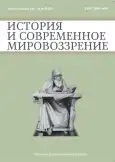Награды многодетным родителям в постсоветских странах
- Авторы: Зайцева Е.В.1, Костина С.Н.1
-
Учреждения:
- Уральский федеральный университет имени первого Президента России Б.Н. Ельцина
- Выпуск: Том 5, № 2 (2023)
- Страницы: 99-105
- Раздел: ДИСКУССИОННЫЕ ПРОБЛЕМЫ ВСЕОБЩЕЙ ИСТОРИИ И МЕЖДУНАРОДНЫХ ОТНОШЕНИЙ
- URL: https://journals.eco-vector.com/2658-4654/article/view/568467
- DOI: https://doi.org/10.33693/2658-4654-2023-5-2-99-105
- EDN: https://elibrary.ru/OQZETC
- ID: 568467
Цитировать
Полный текст
Аннотация
В современный период национальные государства постсоветского пространства проводят различную политику в отношении поддержки многодетности. Имея общую историю поддержки многодетности в советский период, страны реализуют различные ее виды, которые во многом зависят от сложившейся репродуктивной ситуации. Одним из элементов системы мер поддержки многодетности, наряду с выплатами и льготами, выступает наградная политика, целью которой является повышение статуса многодетных семей в обществе. Наградная политика государств в поддержку многодетности не часто становится предметом научного дискурса, тем более работ компаративисткого характера за последние годы практически не было представлено. В данной статье проведен анализ особенностей наградной политики национальных государств постсоветского пространства в отношении многодетных семей. В результате анализа были выделены основные различия в наградной политике национальных государств по видам наград, условиям получения наград и социально-правовым преимуществам, которые дают данные награды. Условия получения наград для многодетных включают требования к субъекту получения награды (мать, отец, семья), в том числе гражданству; количеству, статусу и возрасту детей; а также особенностям поведения субъекта получения награды и его детей.
Ключевые слова
Полный текст
Об авторах
Екатерина Васильевна Зайцева
Уральский федеральный университет имени первого Президента России Б.Н. Ельцина
Автор, ответственный за переписку.
Email: e.v.zaitceva@urfu.ru
ORCID iD: 0000-0003-2112-3029
Scopus Author ID: 57220778399
кандидат социологических наук, доцент, доцент кафедры теории, методологии и правового обеспечения государственного и муниципального управления
Россия, ЕкатеринбургСветлана Николаевна Костина
Уральский федеральный университет имени первого Президента России Б.Н. Ельцина
Email: s.n.kostina@urfu.ru
ORCID iD: 0000-0001-9346-600X
Scopus Author ID: 55825822300
ResearcherId: AAD-7875-2019
кандидат социологических наук, доцент, доцент кафедры теории, методологии и правового обеспечения государственного и муниципального управления
Республика Конго, ЕкатеринбургСписок литературы
- Андреев Е. М., Дарский Л. Е., Харькова Т. Л. Демографическая история России: 1927–1959. М.: Информатика, 1998. 187 с.
- Вишневский А. Демографические последствия Великой отечественной войны // Демографическое обозрение. 2016. Т. 3. №. 2. С. 6–42.
- Запарий В. В., Шуняков Д. В. Награды и наградная система: определения и характеристики // Урал индустриальный. Бакунинские чтения: Индустриальная модернизация России в XVIII–XXI вв. Т. 1. –Екатеринбург, 2018. 2018. С. 333–345.
- Левин О. В. Государственные награды в Российской Федерации: значение и проблемы правового регулирования // Проблемы юридической науки: современное состояние и перспективы развития: Сборник научных трудов. — Саранск: Ковылк. тип., 2007. С. 36.
- Малинкин А. Н. Социальная природа награды: исследование по социологии власти // Журнал социологии и социальной антропологии. 2020. Т. 23. № 3. С. 188–219.
- Трофимов Е. В. Понятие и особенности наград // Социодинамика. — 2013. № 2. С. 23–67. doi: 10.7256/2306-0158.2013.2.39.
- Zaitseva, E., Kostina, S., Bannykh, G., Kuzmin, A. Analysis of the socio-economic situation of large families: the regional dimension //12th International Days of Statistics and Economics. — Melandrium, 2018. — С. 1991–2000.
- Zaitseva, E., Bannykh, G., & Kostina, S. (2019, January). Institutional transformation of households in the epoch of new industrialisation. In 2nd International Scientific conference on New Industrialization: Global, national, regional dimension (SICNI 2018) (pp. 731–736). Atlantis Press. doi: 10.2991/sicni-18.2019.147
Дополнительные файлы











